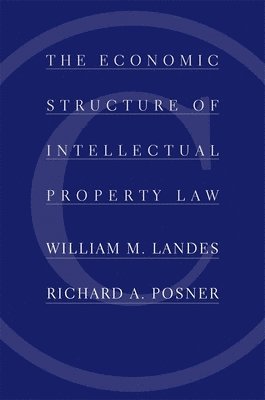
- Format
- Inbunden (Hardback)
- Språk
- Engelska
- Antal sidor
- 448
- Utgivningsdatum
- 2003-11-01
- Förlag
- The Belknap Press
- Medarbetare
- Posner, Richard A.
- Illustrationer
- 23 line illustrations, 9 tables
- Dimensioner
- 240 x 165 x 34 mm
- Vikt
- Antal komponenter
- 1
- ISBN
- 9780674012042
- 700 g
The Economic Structure of Intellectual Property Law
- Skickas från oss inom 5-8 vardagar.
- Fri frakt över 249 kr för privatkunder i Sverige.
Passar bra ihop
De som köpt den här boken har ofta också köpt Rich Dad Poor Dad av Robert T Kiyosaki (häftad).
Köp båda 2 för 1587 krKundrecensioner
Fler böcker av författarna
-
Law, Pragmatism, and Democracy
Richard A Posner
-
The Problems of Jurisprudence
Richard A Posner
-
Not a Suicide Pact: The Constitution in a Time of National Emergency
Richard A Posner
-
Catastrophe
Richard A Posner
Recensioner i media
Intellectual property is the most important public policy issue that most policymakers don't yet get. It is America's most important export, and affects an increasingly wide range of social and economic life. In this extraordinary work, two of America's leading scholars in the law and economics movement test the pretensions of intellectual property law against the rationality of economics. Their conclusions will surprise advocates from both sides of this increasingly contentious debate. Their analysis will help move the debate beyond the simplistic ideas that now tend to dominate. -- Lawrence Lessig, Stanford Law School, author of <i>The Future of Ideas: The Fate of the Commons in a Connected World</i> An image from modern mythology depicts the day that Einstein, pondering a blackboard covered with sophisticated calculations, came to the life-defining discovery: Time = $$. Landes and Posner, in the role of that mythological Einstein, reveal at every turn how perceptions of economic efficiency pervade legal doctrine. This is a fascinating and resourceful book. Every page reveals fresh, provocative, and surprising insights into the forces that shape law. -- Pierre N. Leval, Judge, U.S. Court of Appeals, Second Circuit The most important book ever written on intellectual property. -- William Patry, former copyright counsel to the U.S. House of Representatives, Judiciary Committee Given the immense and growing importance of intellectual property to modern economies, this book should be welcomed, even devoured, by readers who want to understand how the legal system affects the development, protection, use, and profitability of this peculiar form of property. The book is the first to view the whole landscape of the law of intellectual property from a functionalist (economic) perspective. Its examination of the principles and doctrines of patent law, copyright law, trade secret law, and trademark law is unique in scope, highly accessible, and altogether greatly rewarding. -- Steven Shavell, Harvard Law School, author of <i>Foundations of Economic Analysis of Law</i> Chicago law professor William Landes and his polymath colleague Richard Posner have produced a fascinating new book...[The Economic Structure of Intellectual Property Law] is a broad-ranging analysis of how intellectual property should and does work...Shakespeare's copying from Plutarch, Microsoft's incentives to hide the source code for Windows, and Andy Warhol's right to copyright a Brillo pad box as art are all analyzed, as is the question of the status of the all-bran cereal called 'All-Bran.' -- Nicholas Thompson * New York Sun * Landes and Posner, each widely respected in the intersection of law and economics, investigate the right mix of protection and use of intellectual property (IP)...This volume provides a broad and coherent approach to the economics and law of IP. The economics is important, understandable, and valuable. -- R. A. Miller * Choice *
Övrig information
William M. Landes is Clifton R. Musser Professor Emeritus of Law and Economics at the University of Chicago Law School. Richard A. Posner retired as a judge of the United States Court of Appeals for the Seventh Circuit in 2017. He was previously a senior lecturer at the University of Chicago Law School.
Innehållsförteckning
Introduction 1. The Economic Theory of Property 2. How to Think about Copyright 3. A Formal Model of Copyright 4. Basic Copyright Doctrines 5. Copyright in Unpublished Works 6. Fair Use, Parody, and Burlesque 7. The Economics of Trademark Law 8. The Optimal Duration of Copyrights and Trademarks 9. The Legal Protection of Postmodern Art 10. Moral Rights and the Visual Artists Rights Act 11. The Economics of Patent Law 12. The Patent Court: A Statistical Evaluation 13. The Economics of Trade Secrecy Law 14. Antitrust and Intellectual Property 15. The Political Economy of Intellectual Property Law Conclusion Acknowledgments Index
Du kanske gillar
-
Atomic Habits
James Clear
Inbunden


